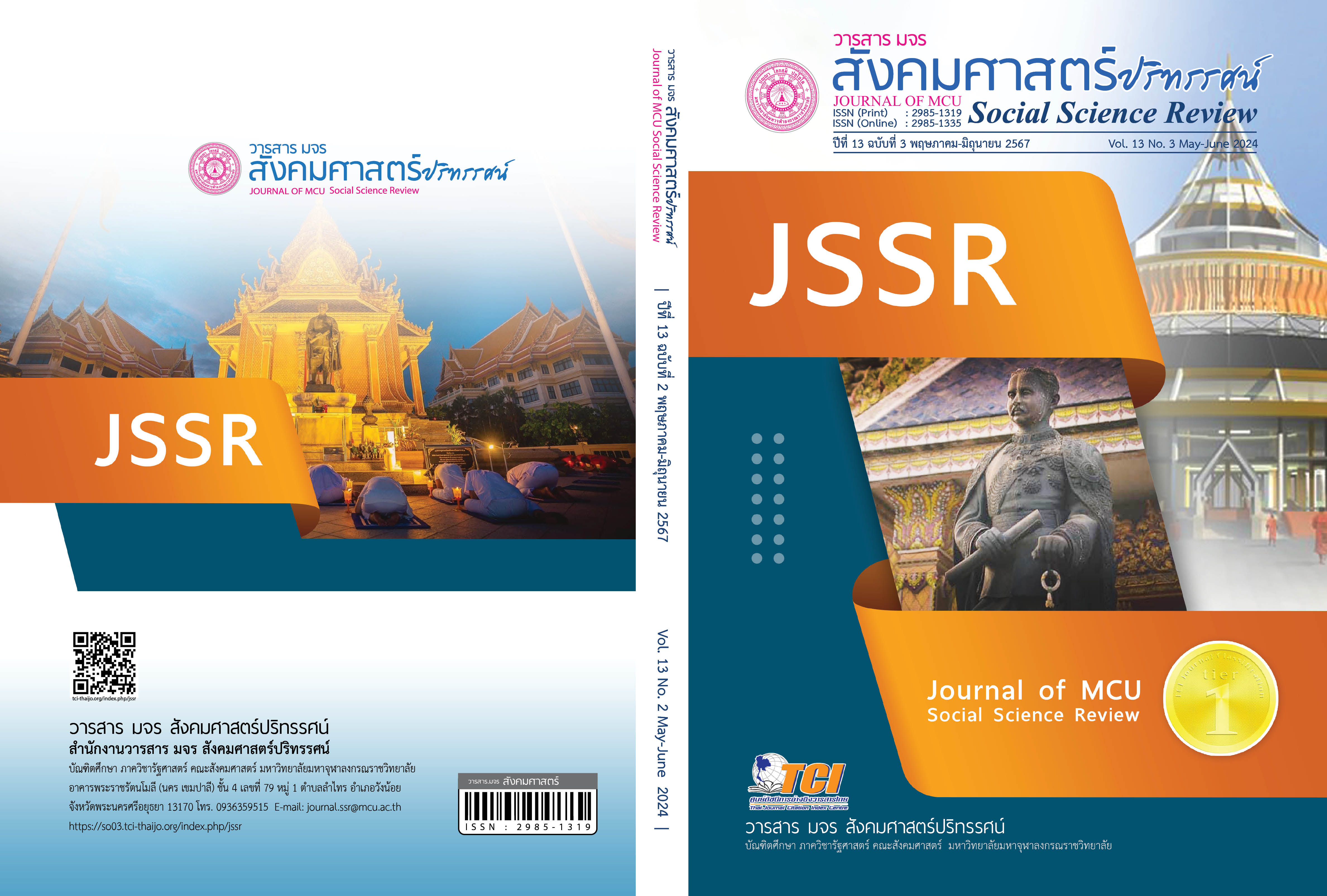กลยุทธ์การพัฒนาภาวะผู้นำดิจิทัลของผู้บริหารสถานศึกษาขั้นพื้นฐาน ที่มีประสิทธิผล
คำสำคัญ:
ภาวะผู้นำดิจิทัล, ผู้บริหารสถานศึกษา, การศึกษาขั้นพื้นฐาน, ประสิทธิผลบทคัดย่อ
บทความวิจัยนี้มีวัตถุประสงค์ 1. ศึกษาข้อมูลพื้นฐานกลยุทธ์การพัฒนาภาวะผู้นำดิจิทัลของผู้บริหารสถานศึกษาขั้นพื้นฐานที่มีประสิทธิผล 2. สร้างกลยุทธ์การพัฒนาภาวะผู้นำดิจิทัลของผู้บริหารสถานศึกษาขั้นพื้นฐานที่มีประสิทธิผล 3. ทดลองใช้กลยุทธ์การพัฒนาภาวะผู้นำดิจิทัลของผู้บริหารสถานศึกษาขั้นพื้นฐานที่มีประสิทธิผล 4. นำเสนอและประเมินกลยุทธ์การพัฒนาภาวะผู้นำดิจิทัลของผู้บริหารสถานศึกษาขั้นพื้นฐานที่มีประสิทธิผล กลุ่มตัวอย่างศึกษาโรงเรียนต้นแบบโดยการสัมภาษณ์ผู้อำนวยการ หัวหน้างานวิชาการ และครู จำนวน 3 โรงเรียน และการศึกษาเชิงปริมาณสภาพปัจจุบัน ปัญหาและความต้องการ การพัฒนาภาวะผู้นำดิจิทัลของผู้บริหารสถานศึกษา จำนวน 437 คน ตรวจสอบและประเมินความเหมาะสม และความเป็นไปได้ของรูปแบบและคู่มือโดยผู้เชี่ยวชาญ 9 คน ทดลองใช้รูปแบบ จำนวน 1 โรงเรียน และประเมินผลจากผู้มีส่วนเกี่ยวข้อง 21 คน เครื่องมือที่ใช้ในการวิจัยประกอบด้วย แบบสัมภาษณ์ แบบสอบถาม แบบทดสอบ แบบประเมินความเหมาะสม ความเป็นไปได้และความเป็นประโยชน์ วิเคราะห์ข้อมูลด้วยการแจกแจงความถี่ และการวิเคราะห์เนื้อหา สถิติที่ใช้ในการวิเคราะห์ข้อมูลคือ ค่าร้อยละ ค่าเฉลี่ย ส่วนเบี่ยงเบนมาตรฐาน
ผลการวิจัยพบว่า 1. สภาพปัจจุบัน ของกลยุทธ์การพัฒนาภาวะผู้นำดิจิทัลของผู้บริหารสถานศึกษาขั้นพื้นฐานที่มีประสิทธิผล ในภาพรวมอยู่ในระดับมาก 2. ผลการสร้างกลยุทธ์การพัฒนาภาวะผู้นำดิจิทัลของผู้บริหารสถานศึกษาขั้นพื้นฐานที่มีประสิทธิผล พบว่ามี 4 กลยุทธ์ คือ 1. การพัฒนาภาวะผู้นำเพื่อการบริหารจัดการมืออาชีพ 2. การสร้างภาคีเครือข่ายการเรียนรู้ 3. การพัฒนาทักษะการใช้เทคโนโลยีดิจิทัลยุคใหม่ และ 4. การจัดหาและนำเทคโนโลยีสารสนเทศมาใช้ในการปฏิรูปการเรียนการสอน 3. ผลการทดลองกลยุทธ์การพัฒนาภาวะผู้นำดิจิทัลของผู้บริหารสถานศึกษาขั้นพื้นฐานที่มีประสิทธิผลในภาพรวมอยู่ในระดับมากที่สุด และ 4. ผลการประเมินความเหมาะสม ความเป็นไปได้และความเป็นประโยชน์ของกลยุทธ์การพัฒนาภาวะผู้นำดิจิทัลของผู้บริหารสถานศึกษาขั้นพื้นฐานที่มีประสิทธิผลพบว่าโดยรวมมีความเหมาะสมอยู่ในระดับมากที่สุดคือ ความเป็นไปได้และความเป็นประโยชน์อยู่ในระดับมาก
เอกสารอ้างอิง
จิณณวัตร ปะโคทัง. (2562). ภาวะผู้นำยุคดิจิทัลสำหรับผู้บริหารสถานศึกษามืออาชีพ. อุบลราชธานี: โรงพิมพ์ศิริธรรมออฟเซ็ท.
ธีระ รุญเจริญ. (2554). ความเป็นมืออาชีพในการจัดและบริหารจัดการศึกษายุคปฏิวัติการศึกษา (ฉบับปรับปรุง) เพื่อปฏิรูปรอบสองและการประเมินภายนอกรอบ 3 (พิมพ์ครั้งที่ 6). กรุงเทพฯ: ข้าวฟ่าง.
บุญชม ศรีสะอาด. (2545). การวิจัยเบื้องต้น (พิมพ์ครั้งที่ 7). กรุงเทพฯ: สุรีวิทยาสาส์น.
ปณิลิน จันภักดี. (2565). ภาวะผู้นำเหนือผู้นำของผู้บริหารกับประสิทธิผลของสถานศึกษาสังกัด สำนักงานเขตพื้นที่การศึกษาประถมศึกษาราชบุรี เขต 2 (วิทยานิพนธ์ศึกษาศาสตรมหาบัณฑิต สาขาวิชาการบริหารการศึกษา). กรุงเทพฯ: มหาวิทยาลัยศิลปากร.
รุ่งรัตน์ พลชัย. (2563). ภาวะผู้นำกับการบริหารในยุคดิจิทัล. วารสารมนุษยศาสตร์และสังคมศาสตร์ มมร วิทยาเขตอีสาน, 1(3), 53-62.
เรวัตร์ ชาตรีวิศิษฏ์ และคณะ. (2554). ความเป็นมืออาชีพในการจัดและบริหารจัดการศึกษายุคปฏิบัติการศึกษา (ฉบับปรับปรุง) เพื่อปฏิรูปรอบสองและการ ประเมินภายนอกรอบ 3 (พิมพ์ครั้งที่ 6). กรุงเทพฯ: ข้าวฟ่าง.
วิเชียร ทองคลี่. (2560). การศึกษาความสัมพันธ์ระหว่างภาวะผู้นำทางวิชาการของผู้บริหารสถานศึกษากับการจัดการ เรียนรู้ในโรงเรียน สังกัดสำนักงานเขตพื้นที่การศึกษามัธยมศึกษา เขต 3 (วิทยานิพนธ์คณะครุศาสตรมหาบัณฑิต สาขาวิชาการบริหารการศึกษา). นครราชสีมา: มหาวิทยาลัยราชภัฏนครราชสีมา.
Dessler. (1991). Human resource management (8th ed.). New Jersey: Prentice-Hall Inc.
Smith & Piele (2006). School leadership: Handbook for excellence in student learning (4th ed.). Thousand Oaks, CA: Corwin Press.
Smith & Purkey. (2006). Effective school: A review. The Elementary School Journal, 83(4), 427-452.
ดาวน์โหลด
เผยแพร่แล้ว
รูปแบบการอ้างอิง
ฉบับ
ประเภทบทความ
สัญญาอนุญาต
ลิขสิทธิ์ (c) 2024 วารสาร มจร สังคมศาสตร์ปริทรรศน์

อนุญาตภายใต้เงื่อนไข Creative Commons Attribution-NonCommercial-NoDerivatives 4.0 International License.
เพื่อให้เป็นไปตามกฎหมายลิขสิทธิ์ ผู้นิพนธ์ทุกท่านต้องลงลายมือชื่อในแบบฟอร์มใบมอบลิขสิทธิ์บทความให้แก่วารสารฯ พร้อมกับบทความต้นฉบับที่ได้แก้ไขครั้งสุดท้าย นอกจากนี้ ผู้นิพนธ์ทุกท่านต้องยืนยันว่าบทความต้นฉบับที่ส่งมาตีพิมพ์นั้น ได้ส่งมาตีพิมพ์เฉพาะในวารสาร มจร สังคมศาสตร์ปริทรรศน์ เพียงแห่งเดียวเท่านั้น หากมีการใช้ภาพหรือตารางหรือเนื้อหาอื่นๆ ของผู้นิพนธ์อื่นที่ปรากฏในสิ่งตีพิมพ์อื่นมาแล้ว ผู้นิพนธ์ต้องขออนุญาตเจ้าของลิขสิทธิ์ก่อน พร้อมทั้งแสดงหนังสือที่ได้รับการยินยอมต่อบรรณาธิการ ก่อนที่บทความจะได้รับการตีพิมพ์ หากไม่เป็นไปตามข้อกำหนดเบื้องต้น ทางวารสารจะถอดบทความของท่านออกโดยไม่มีข้อยกเว้นใดๆ ทั้งสิ้น





